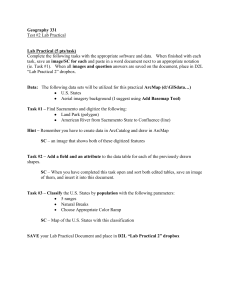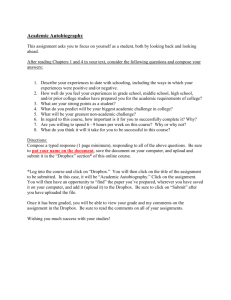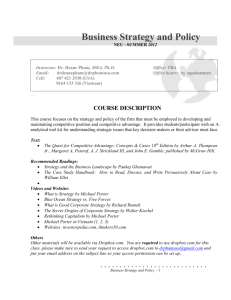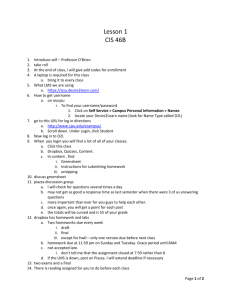ES 779: Working Effectively with Adults Syllabus
advertisement
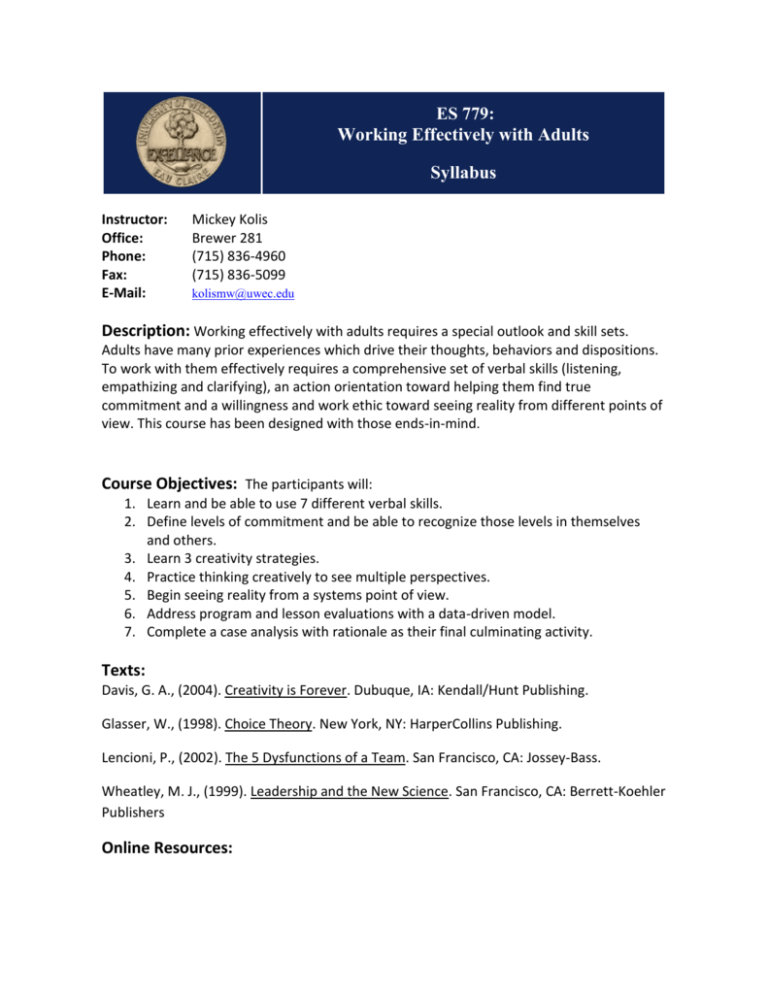
ES 779: Working Effectively with Adults Syllabus Instructor: Office: Phone: Fax: E-Mail: Mickey Kolis Brewer 281 (715) 836-4960 (715) 836-5099 kolismw@uwec.edu Description: Working effectively with adults requires a special outlook and skill sets. Adults have many prior experiences which drive their thoughts, behaviors and dispositions. To work with them effectively requires a comprehensive set of verbal skills (listening, empathizing and clarifying), an action orientation toward helping them find true commitment and a willingness and work ethic toward seeing reality from different points of view. This course has been designed with those ends-in-mind. Course Objectives: The participants will: 1. Learn and be able to use 7 different verbal skills. 2. Define levels of commitment and be able to recognize those levels in themselves and others. 3. Learn 3 creativity strategies. 4. Practice thinking creatively to see multiple perspectives. 5. Begin seeing reality from a systems point of view. 6. Address program and lesson evaluations with a data-driven model. 7. Complete a case analysis with rationale as their final culminating activity. Texts: Davis, G. A., (2004). Creativity is Forever. Dubuque, IA: Kendall/Hunt Publishing. Glasser, W., (1998). Choice Theory. New York, NY: HarperCollins Publishing. Lencioni, P., (2002). The 5 Dysfunctions of a Team. San Francisco, CA: Jossey-Bass. Wheatley, M. J., (1999). Leadership and the New Science. San Francisco, CA: Berrett-Koehler Publishers Online Resources: http://www.ehow.com/list_6018794_activities-verbal-communication-skills.html http://www.ehow.com/how_5418579_improve-verbal-communication-skills.html http://www.criticalthinking.com/company/articles/verbal-reasoning-skills.jsp http://creativityforlife.com/ http://www.creativityatwork.com/what-is-creativity/ http://projects.coe.uga.edu/epltt/index.php?title=Creativity http://www.clrn.org/elar/dddm.cfm http://www.centerforcsri.org/index.php?option=com_content&task=view&id=85&Itemid=77 http://www.mcrel.org/PDF/LeadershipOrganizationDevelopment/5031TG_datafolio.pdf http://www.kaushik.net/avinash/seven-steps-to-creating-a-data-driven-decision-making-culture/ Technology Requirements: High-speed internet connection capable of supporting advanced web browser, audio and video-conferencing. Web-cam Skype or equivalent web-conferencing software. Requirements: 1. 2. 3. 4. 5. 6. 7. Participate in class discussion and exercises. Participate in verbal skills practice (via Skype). Construct a graphic organizer about their lives. Complete worksheets / group tasks utilizing creativity skills. Participate in group chats dealing with levels of commitment in self and others. Relate levels of commitment to intrinsic and extrinsic motivation factors. For a scenario, list multiple realities and appropriate and multiple ways of dealing with each situation. Evaluation Attendance /On-Time Policy: Your attendance online is expected to meet task deadlines. Class work is to be completed and turned in on-time. Failure to participate in scheduled online meetings or work turned in late will impact student grades. Late work will drop one letter grade per week past due date. Incomplete Policy: An incomplete may be granted when, for some reasons acceptable to the instructor, a student has been able to complete a portion of a course in the normal time period. Both the incomplete grade and the final grade will appear on the record. Students with Disabilities: The University of Wisconsin- Eau Claire abides by the Americans with Disabilities Act (ADA). Students needing special accommodations should contact the instructor and contact Services for Students with Disabilities Office (836-4542). Accommodations: Any student who has a disability and is in need of classroom accommodations, please contact the instructor and the Services for Students with Disabilities Office in Old Library 2136 at the beginning of the semester. Civility: As members of this class, we are members of a larger learning community where excellence is achieved through civility. Our actions affect everyone in our community. Courtesy is reciprocated and extends beyond our local setting, whether in future jobs, classes, or communities. Civility is not learned individually, it is practiced as a community. Academic Integrity: I consider any academic misconduct in this course as a serious offense, and I will pursue the strongest possible academic penalties for such behavior. The disciplinary procedures and penalties for academic misconduct are described on the UW-Eau Claire Dean of Students web site (http://www.uwec.edu/dos/Codes/ch14.htm ) in Chapter UWS 14—Student Academic Disciplinary Procedures. Religious Accommodations: Students who need to be absent from class due to the observance of a religious holiday or participate in required religious functions must notify the faulty member in writing as far in advance of the holiday/obligation as possible. Students will not be penalized for missing class due to religious obligations/holiday observance. The student should contact the class instructor to make arrangements for making up tests/assignments within a reasonable time. Non-discrimination: UW-Eau Claire’s policy prohibits discrimination based on race, sex, age, religion, national origin, disability, sexual orientation, gender identity or expression, veteran status, and any other category protected by applicable law. Violations of this policy may result in disciplinary action. Accommodations for English Language Learners: In courses that require tests (in which the primary language of instruction and assessment is English) to be taken during class time, students who are non-native speakers of English may request extended test-taking time (time and a half). To determine eligibility, English proficiency is evaluated by the Academic Skills Center (for U. S. permanent residents/citizens) or by the Department of Foreign Languages (for international students). Students approved for the accommodation are given a verification form to present to their course instructors. Students must provide verification during each semester at least one week before the test for which accommodation is needed. Verification is valid for one semester. The accommodation policy does not apply to other forms of evaluation (e.g., papers, projects, group presentations) or to situations in which students must demonstrate clinical or similar skills. (Senate approved policy) ES 779: Working Effectively with Adults Tasks and Deadlines Task: 1. Verbal Skills 2. Levels of Commitment 3. Creativity Skills Activity / Assignment: 1. Worksheets (3) 2. Role plays (4) Where to put the When it is Due: document: End of Week ___ Dropbox 1 Via Skype – 3 verification via Discussion 1. Personal examples for each level 2. Read Choice Theory (Needs orientation) 3. Read Intrinsic / Extrinsic motivators 4. Read The 5 Dysfunctions of a Team 5. Create an Action Plan for dealing with another person more effectively Dropbox 2 10 Discussion – answer the prompt Discussion – answer the prompt Discussion – answer the prompt Dropbox and Discussion 2 20 4 10 4 20 6 30 1. Brainstorming Homework lists via D2L Groups Homework lists via D2L Groups Homework lists via D2L Groups Discussion 3 10 4 10 5 10 4 30 Discussion 5 10 2. SCAMPER 3. Reverse Brainstorming 4. For one “Life Scenario” list multiple (at least 3 unique) perspectives 4. Critical Thinking 1. Identify “criteria” for Grade: (points) 30 40 making decisions 2. IDEA Evaluator 5. Systems Thinking 1. Create a “Life” Graphic Organizer 2. Identify one personal catharsis experience – provide 3 different endings possible 3. Role of context 4. Include the Idea of leverage in Action Plan Dropbox and Discussion 5 10 Dropbox 4 20 Dropbox and Discussion 6 30 Discussion Dropbox and Discussion 6 6 10 40 Mickey Kolis kolismw@uwec.edu Education Studies University of Wisconsin-Eau Claire COMPREHENSIVE COURSE OUTLINE ES 779: Working Effectively with Adults I. COURSE JUSTIFICATION A. Educational Objectives/Outcomes. Participants will be able to: 8. Learn and be able to use 7 different verbal skills. 9. Define levels of commitment and be able to recognize those levels in themselves and others. 10. Learn 3 creativity strategies. 11. Practice thinking creatively to see multiple perspectives. 12. Begin seeing reality from a systems point of view. 13. Address program and lesson evaluations with a data-driven model. 14. Complete a case analysis with rationale as their final culminating activity. B. Relationship to Curriculum. ES 779 is a new course that responds to demands by professionals working in non-school educational settings for graduate level opportunities to learn to work more effectively with their audience populations. Since the majority of their audiences are adults, having a background of knowledge and skills is useful and worthwhile to their jobs and careers. ES 779 is a stand-alone course. It could also be bundled with other proposed courses to meet the requirements for a certificate in adult literacy. It is not linked to existing graduate courses or degrees offered in the College of Education and Human Sciences or the Department of Education Studies. ES 779 would complement existing courses in curriculum development but not duplicate them since the focus of ES 779 is specific to designers of programs for adult learners rather than teachers of P-12 pupils. Currently, only one course in Education studies provides opportunities to understand the learning approaches of adult learners. ES 779 adds to the array by specifically considering questions of meeting adults learners needs within a work setting. C. Potential Duplication. No evidence of course or content duplication was identified in reviewing existing COEHS graduate courses. D. Targeted Student Population. Advanced professionals with responsibilities for educational program management, assessment and evaluation such as technical school program coordinators, health care education program managers, business staff development managers. E. Registration Restriction Rationale. No registration restrictions are proposed F. Credit Restriction Rationale. No credit restrictions are proposed. G. Service-Learning Designation. N/A H. Cultural Diversity Designation. N/A I. Foreign Culture Designation. N/A J. Interdisciplinary Studies (IDIS) Designation. N/A K. Wellness Theory Designation. N/A L. General Education Program Designation. N/A M. Honors Program Designation. N/A II. COURSE CONTENT A. Scheduled Periods of Instruction. The proposed course is designed to be completed entirely online in six weeks rather than the traditional 15-week semester to accommodate the needs of full time professionals not enrolled in graduate degree programs. The course schedule and learning activity distribution is presented below. It is anticipated that participants will invest approximately 20 hours per week. Task: 1. Verbal Skills 2. Levels of Commitment 3. Creativity Skills Activity / Assignment: 1. Worksheets (3) 2. Role plays (4) Where to put the When it is Due: document: End of Week ___ Dropbox 1 Via Skype – 3 verification via Discussion 1. Personal examples for each level 2. Read Choice Theory (Needs orientation) 3. Read Intrinsic / Extrinsic motivators 4. Read The 5 Dysfunctions of a Team 5. Create an Action Plan for dealing with another person more effectively Dropbox 2 10 Discussion – answer the prompt Discussion – answer the prompt Discussion – answer the prompt Dropbox and Discussion 2 20 4 10 4 20 6 20 1. Brainstorming Homework lists via D2L Groups Homework lists via D2L Groups Homework lists via D2L Groups 3 10 4 10 5 10 2. SCAMPER 3. Reverse Brainstorming Grade: (points) 30 40 4. Critical Thinking 5. Systems Thinking 4. For one “Life Scenario” list multiple (at least 3 unique) perspectives Discussion 4 20 1. Identify “criteria” for making decisions 2. IDEA Evaluator Discussion 5 10 Dropbox and Discussion 5 10 1. Create a “Life” Graphic Organizer 2. Identify one personal catharsis experience – provide 3 different endings possible 3. Role of context 4. Include the Idea of leverage in Action Plan Dropbox 4 20 Dropbox and Discussion 6 20 Discussion Dropbox and Discussion 6 6 10 20 B. Master Course Syllabus. Attached. Liberal Education Learning Goals are not applicable. Learning resources are listed in the course syllabus. Additional bibliographic information is included as an appendix The topical outline, evaluation model and period are included above. Other Evaluation policies are included below: Attendance /On-Time Policy: Your attendance online is expected to meet task deadlines. Class work is to be completed and turned in on-time. Failure to participate in scheduled online meetings or work turned in late will impact student grades. Incomplete Policy: An incomplete may be granted when, for some reasons acceptable to the instructor, a student has been able to complete a portion of a course in the normal time period. Both the incomplete grade and the final grade will appear on the record. Students with Disabilities: The University of Wisconsin- Eau Claire abides by the Americans with Disabilities Act (ADA). Students needing special accommodations should contact the instructor and contact Services for Students with Disabilities Office (836-4542). Accommodations: Any student who has a disability and is in need of classroom accommodations, please contact the instructor and the Services for Students with Disabilities Office in Old Library 2136 at the beginning of the semester. Civility: As members of this class, we are members of a larger learning community where excellence is achieved through civility. Our actions affect everyone in our community. Courtesy is reciprocated and extends beyond our local setting, whether in future jobs, classes, or communities. Civility is not learned individually, it is practiced as a community. Academic Integrity: I consider any academic misconduct in this course as a serious offense, and I will pursue the strongest possible academic penalties for such behavior. The disciplinary procedures and penalties for academic misconduct are described on the UW-Eau Claire Dean of Students web site (http://www.uwec.edu/dos/Codes/ch14.htm ) in Chapter UWS 14—Student Academic Disciplinary Procedures. Religious Accommodations: Students who need to be absent from class due to the observance of a religious holiday or participate in required religious functions must notify the faulty member in writing as far in advance of the holiday/obligation as possible. Students will not be penalized for missing class due to religious obligations/holiday observance. The student should contact the class instructor to make arrangements for making up tests/assignments within a reasonable time. Non-discrimination: UW-Eau Claire’s policy prohibits discrimination based on race, sex, age, religion, national origin, disability, sexual orientation, gender identity or expression, veteran status, and any other category protected by applicable law. Violations of this policy may result in disciplinary action. Accommodations for English Language Learners: In courses that require tests (in which the primary language of instruction and assessment is English) to be taken during class time, students who are nonnative speakers of English may request extended test-taking time (time and a half). To determine eligibility, English proficiency is evaluated by the Academic Skills Center (for U. S. permanent residents/citizens) or by the Department of Foreign Languages (for international students). Students approved for the accommodation are given a verification form to present to their course instructors. Students must provide verification during each semester at least one week before the test for which accommodation is needed. Verification is valid for one semester. The accommodation policy does not apply to other forms of evaluation (e.g., papers, projects, group presentations) or to situations in which students must demonstrate clinical or similar skills. (Senate approved policy) C. Proposed Class Size. 12 – 15 graduate students. D. Writing Requirements. All submissions for evaluative purposes are expected to conform to the publication standards of the student’s professional environment. E. Diversity Content. Varies according to participant needs F. Gender Content. Varies according to participant needs G. Graduate/Undergraduate Differentiation. N/A III. EVALUATION A. Instruction Evaluation. Evaluation of instruction will be completed according to the provisions of the Education Studies Department Evaluation Plan and the procedures of the Continuing Education Office using approved student rating of instruction surveys, Continuing Education program evaluation surveys and meetings between students and Continuing Education staff. Evaluation procedures are completed each time the course is offered. B. Frequency of Instruction Evaluation. Each time the course is offered. C. Content /Pedagogical Evaluation. Included above. Surveys and group meetings include items specific to the course content, instructional resources, modes of instruction, and methods by which participant learning is assessed and evaluated. D. Frequency of Content/Pedagogical Evaluation. Included above. IV. RESOURCES A. Facility Needs. Online resources are adequate B. Materials/Equipment Needs. Students will need access to internet capable systems with high-speed connections. A typical desktop or laptop computer is sufficient. Web-cam enabled systems with microphone and conferencing software (e.g., Skype) are required for this course. C. Library/Media/Computing Needs. Adequate for intended audience and course expectations. D. Qualified Instructors. Dr. Robert E. Hollon; Dr. Michael Kolis; Dr. Susan McIntyre
